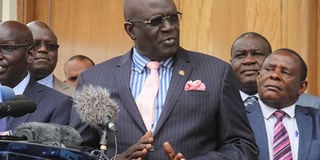Knec remains steadfast in face of attacks over exam leakage

Kenya National Examinations Council chairman George Magoha addresses the media about national exam preparations, at KICD on October 1, 2018. PHOTO | MARTIN MUKANGU | NATION MEDIA GROUP
What you need to know:
- Knec has banned mobile phones in examination centres, warning that it will suspend examinations at any school where the devices are found.
- In Mandera County, non-local teachers have over the years decried the difficult situation they face every examination period.
With eight days remaining before the start of the Kenya Certificate of Secondary Education (KCSE) practicals on October 22, the examinations council is facing an uphill battle to eliminate irregularities, with teachers being increasingly targeted for attacks by cartels and individuals determined to cheat.
Saturday Nation has catalogued several incidents in recent weeks where teachers have been attacked over their alleged unwillingness to facilitate exam fraud.
The attacks are planned by people keen to leak examination materials before time or those seeking to facilitate students to get answers during the examination period through mobile phones.
Some attacks are also fuelled by candidates’ determination to have mobile phones in the exam rooms.
The Kenya National Examinations Council (Knec) has banned the devices in examination centres, warning that it will suspend examinations at any school where mobile phones are found.
KILLED
On Friday, Knec chairman George Magoha condemned the attacks on teachers, saying the government is determined to ensure that exams are done in a conducive environment.
“No amount of intimidation against teachers will stop us from ensuring no cheating occurs,” he warned in a telephone interview.
And as some candidates and teachers plot how to cheat, Education Cabinet Secretary Amina Mohamed will on Monday meet top security officers and education officials to put final touches on preparations for the national examinations.
More than 1,000 officials will be at Kenya School of Government for briefing on how the examinations will be managed.
In Mandera, two teachers were killed at Arabia Boys Secondary School early this week in what is alleged to have been caused by a fallout over examinations. However, some sources said Al-Shabaab were to blame.
SHABAAB
A well-placed security source revealed that initial investigations ruled out Al-Shabaab’s hand in the murder of the two teachers.
“We are looking at the school community and not Al-Shabaab because the mode of execution rules out the militants,” he said.
At Namulungu Secondary School in Kakamega, a deputy head teacher is still nursing a serious head injury inflicted on him by a candidate after he confiscated a mobile phone two weeks ago.
In Elgeyo Marakwet, students of Marakwet Boys High School were last month arrested in connection with the burning of their dormitory after they were denied access to mobile phones ahead of the KCSE exams.
At Ortum Boys School in West Pokot County, students recently went on the rampage after the principal failed to assure them that he would help them to cheat in the national examinations.
The police have done little so far to deal with the perpetrators of the attacks. For instance, the candidates who attacked 12 teachers in Marsabit three months ago are yet to be arrested.
The teachers had been accused of failing to help the students commit exam irregularities.
INTIMIDATE
In Mandera County, non-local teachers have over the years decried the difficult situation they face every examination period.
They have faced threats, while some were beaten up or harassed by students, fellow teachers or even parents over their failure to cooperate in exam cheating.
Mr Elijah Nderitu, 25, an English and Literature teacher, told the Saturday Nation that on Tuesday this week, several Form Three students were caught cheating in an examination.
“I caught a boy with a mobile phone in the examination room during Kiswahili paper two. I confiscated it and handed the phone to the deputy principal,” Mr Nderitu said.
In North Eastern, a Kenya National Union of Teachers branch executive secretary, Mr Mohamed Kullow, said his office has dealt with cases of teachers being insulted over examinations and he feared the worst for the forthcoming exams.
“As Knut, we demand speedy investigations and arrest of all perpetrators of that heinous act whether they are students or any other person,” he said.
RESULTS
Many non-local teachers avoid being appointed supervisors in Mandera for fear of being attacked by candidates.
TSC county director Ahmed Jimale said they were facing challenges administering examinations in some areas.
In the Rift Valley, Ortum Boys candidates protested after failing to get an assurance from the principal that he will aid them in cheating.
The school administration however stood its ground that cheating in national examinations comes with consequences.
Last year, Knec cancelled the results of 500 students at the school and St Cecelia Girls Chepareria for cheating.
At Namulungu Secondary School in western Kenya, Mr Ben Mutibo, the deputy principal, is still nursing injuries after being attacked by a candidate.
ATTACK
Mr Mutibo said a candidate went to his house armed with a machete at night and knocked on the door.
“I was expecting a teacher so when I opened the door, the student hit me with a panga on the head. We fought and he managed to escape,” he said.
“He was wearing a hoodie to hide his identity but fortunately I managed to get his bag, which had a jacket and other items.”
In July, six non-local teachers at Chalbi High School were attacked and seriously injured by students after they were linked to last year’s cancellation of KCSE examinations that affected 70 students.
Kenya Secondary School Heads Association chairman Kahi Indimuli said parents must be held responsible for availability of phones in schools.
“Parents are buying their children expensive phones and want them to possess the phones in schools despite tough examination regulations,” Mr Indimuli said.







